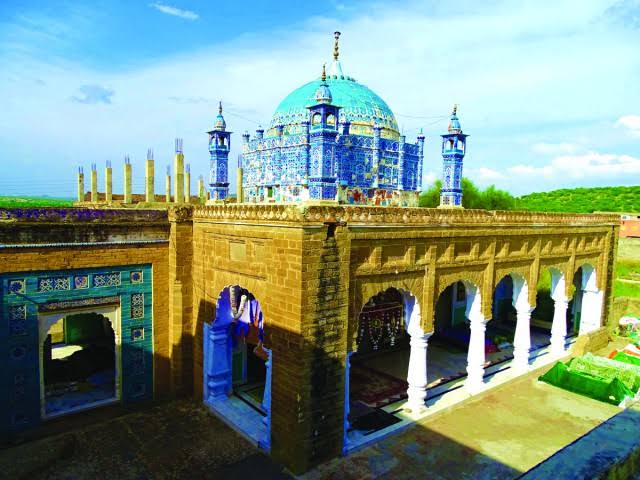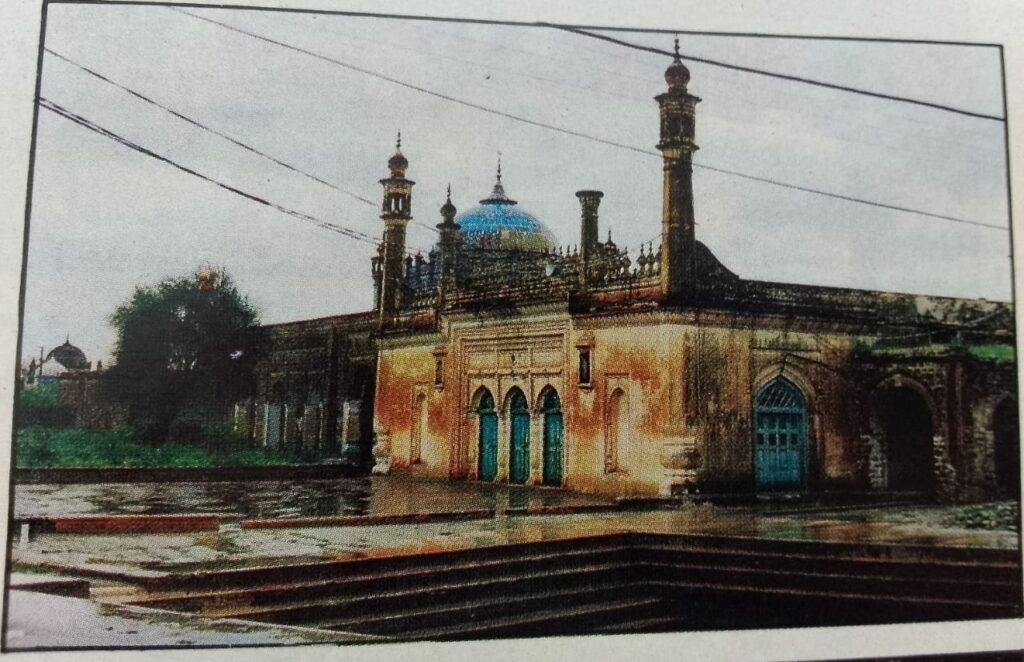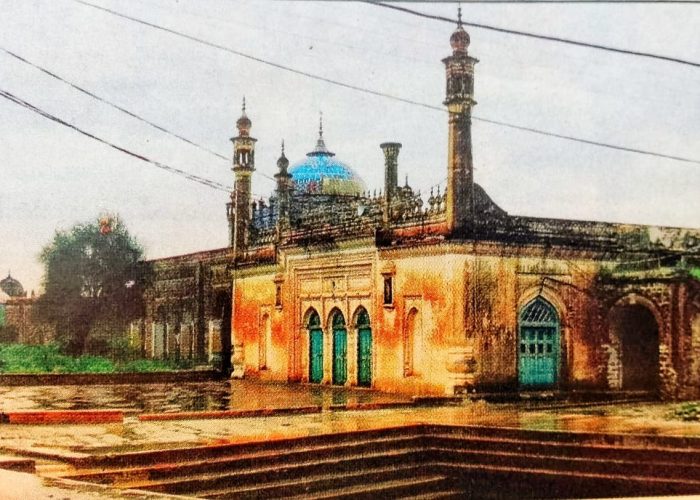Hazrat Maolana Muhammad Ali Makhadi (RA)
Early Life:
Hazrat Maolana Muhammad Ali Makhadi (RA) was born in 1164 AH corresponding to 1750 AD. His father’s name was Maulana Muhammad Shafi (RA). The author of ‘Tazkirat al-Haboob’ has summed up Hazrat Maulana Muhammad Ali (RA)’s genealogy as: Maulana Muhammad Ali Makhadi (RA) s/o Muhammad Shafi (RA) s/o Muhammad Daud Jalalabadi (RA). He was born in the famous city of Batala (District Amritsar) of East Punjab in present day India. Renowned Sufi sage Hazrat Shah Ghulam Ali Naqshbandi Dehlvi was His cousin.

Outer View of Khanqah-e-Mubarak Hazrat Maulana Muhammad Ali Makhadi (RA)
As Teacher:
For a long time, he continued to acquisition education with Maulana Mohkam ud Deen Makhadi (RA). Once, the respected Teacher visited a place during last days of his life, (unfortunately, the place name neither mentioned nor found anywhere) he died there, then, after burriel of Late Respected teacher Maulana packed his belongings to leave Makhad Sharif for some another place but the residents of Makhad Sharif approached and made extremely request to him to stay here (Makhad Sharif) to continue the educational system of Maulana Mokham ud Deen Makhadi (RA). On the utmost request of the people of Makhad, Maulana Muhammad Ali Makhadi conducted his teacher’s educational system (Madrassa) so well that his scholarly knowledge started to be discussed far and near, and not only near and far, but also in Samarkand, Bukhara, Kabul and Kandahar, in order to quench the thirst, the students from farther areas even from centeral Asia started gathering at Makhad Sharif. The circle of His disciples is very wide, but the disciples who spread globaly the name of their teacher, the names of Maulana Shamsuddin Sialvi, Khalifa Muhammad Abidji, MianZainuddin Mukhdi and Hafiz Maulana Rahmatullah of Batalvi (grandson of Maulana’s brother Abdul Rasool) are included.

Old Mosque adjacent to Khanqah-e-Mubarak Hazrat Maulana Muhammad Ali Makhadi (RA)
Education and Teachers:
Maulana’s parents died in his childhood. He was brought up under the shadow of his elder brother, Maulana Abdul Rasool (RA). He also received very early education from him (Maulana Abdul Rasool (RA)). In the art of literature, Mian Janwaullah Batalvi is the teacher who taught the literature. Later, for the purpose of seeking knowledge, with the permission of His elder brother and after receiving blessings knowledge and education from various teachers, to seek more and higher education, He left His homeland for Makhad Sharif. Among his teachers were Maulana Abdul Rasool, Mian Jan Ullah Batalvi, Molvi Asadullah Bahawalpuri (who was a contemporary of Qibla scholar Hazrat Noor Muhammad Maharavi) Mian Mustafa Jee Peshawari (Buried in Lahori Darwaza, Peshawar Mian Murtaza Awan Qadri Jialvi Jiyal, Talagang) and the name of Maulana Mohkam ud Deen Makhadi (RA) are included. Finally, when He came to Maulana Mohkam Ud Deen (RA), He stayed there forever. Hazrat Maulana Muhammad Ali Makhadi (RA) found every kind of education for that He left His home in search of. Here, Maulana (RA) remaind busy in getting education from His teacher, Maulana Mohkam ud Deen (RA) until his demise. Initially He learnt “Mir Zahid” from His teacher. Maulana found such a perfect teacher that if any kind of question or confusion remained in his mind, before expression, respected teacher would have given the answer and the confusion would have been resolved.
Allegiance and Caliphate (Bait-o-Khilafat)
Hazrat Maulana Muhammad Ali Makhadi (may God bless him and grant him peace) had achieved a very distinguished position in his practical character as well as in his accomplishments and specialty in Islamic Sharia. After studying Islamic studies, the services for teaching and spreading Islam continued and beside He started looking for a mentor (Murshid). To achieve this quest, He performed istikhara. He dreamed The Holy Prophet Hazrat Muhammad (peace be upon him) Who ordered to travel towards a place named Mulk Laman (toward the flow of the Indus River) to achieve the goal. The process of Istikhara continued for three consecutive nights. On the third night, Maulana (RA), in dream, begged request in the presence of the Holy Prophet, peace and blessings be upon him, that I could not understand. So, along with the indication, the order was also said towards Mulk Laman. In this way, he took his prominent disciple Khawaja Shams Ud Deen Sialvi (may God bless him and grant him peace) with him and started journey by boat towards the ‘destination’ in Indus River. Finally, he reached the place of Taunsa Sharif, where he was blessed with the visit of Hazrat Khwaja Shah Suleman Taunsvi, may Allah havemercy on him. Hazrat Khwaja Shah Suleman Taunsvi (may God bless him) pledged allegiance to Hazrat Maulana Muhammad Ali Makhadi (RA) and awarded him the ‘Khirqa-e-Khilafat’. Maulana sahab (RA) received an order from His Mentor, Hazrat Khwaja Shah Suleman Taunsvi (may God bless him) to go back to Makhad Sharif and stay there to teach and guide the people to right path, Islam. He came back and started teaching Islamic Spiritual Education and Values. Not only from surroundings, people from far and wide would come toseek education and would also pledge allegiance (Bait) to Him. Thus the teachings and training, both external and spiritual, continued.

Library:
The library is associated with the name of Maulana Muhammad Ali Makhadi. After granting allegiance and caliphate by Pir Pathan Hazrat Khawaja Shah Muhammad Suleman Tunsvi (RA), Hazrat Maulana sb founded the Chishtiyya Nizamiya Monastery in Makhad Sharif, He also founded a library along with it. This library is remembered by the name of Maulana Muhammad Ali Makhadi Library. There are hundreds of books on various topics that remind us of the grandeur of that era. In Maulana’s library, there are a number of books on Tafsir, Hadith, Biography, Fiqh, Sufism, History, Literature, Logic, Kalam, Principles of Change, Principles of Hadith, Principles of Jurisprudence, Legacy of Medicine and other topics. This library also has the status of having a large number of manuscripts covering various topics of Arabic, Persian and Punjabi languages. And among these manuscripts there are many manuscripts whose second copy is not available in any other library in the world. The total number of manuscripts, publications and magazines is more than 15000. After Maulana’s demise (1253 AH/1837 AD), His successors (Sajjada Nasheenan) further expanded this library. This library was decorated by ordering manuscripts from Kabul, Samarkand and Bukhara. Today, the library is considered one of the great collections of books in the country, Pakistan. (See Library tab for more detail).
Poetry:
Hazrat Maulana Muhammad Ali Makhadi (RA) was not only a scholar and a Sufi, but also a language adroit-poet of Persian and Punjabi. He used ‘Molvi’ as pseudonym. It’s regret His complete Persian and Punjabi poetry could not preserved. However, it is not difficult to determine His poetic status from the available words. Most of His poetry was included in his collection of Molana’s sayings “Tazkira-tul-Mahboob” by Molvi Abd-un-Nabi (resident of Bhoi gaar, Tehsil Hasan Abdal). This collection of ‘Sayings’ has not been officially printed yet, however, Hazrat Maolana Muhammad Deen Makhadi (RA) published its translation as the name of “Tazkira-tul-Wali” he added many personal references with it. In particular, many stanzas of Punjabi three syllables (Punjabi seh’harfi) were preserved through this translation. The second edition of Tazkira-tul-Wali was published in 1996 under as name of Mehr-e-Taban. A Punjabi three syllable (Punjabi seh’harfi) by Maolana Muhammad Ali Makhadi, titled “Seh Harfi Molvi Sahab Makhad’wala” has also been published by Haji Chiragh-ud-deen Siraj-ud-deen Tajran Books Lahore.
Maulana Makhadi’s Persian poetry, although, available only in the form of nine ghazals. However, scholars and mystics have highly praised His poems. Regarding His poetry, Maolana Mohammad-ud-Deen Makhadi (RA) has described this in reference to Maolana Najam-ud-Deen in Tazkira-tul-Wali: ‘Molvi Najmuddin Sahib writes in Manaqib-ul-Mahboobeen that in the month of Shawwal 1253 AH / 1837 AD, on the day when the news of Hazrat Maolana Muhammad Ali Makhadi’s demise, Hazrat Pir Pathan Khawaja Shah Muhammad Suleman Taunsvi (RA) was sitting after Asr prayer in His tritest-mosque and the writer of the narration was also present there. Hazrat Sahab said that Molvi Sahab was known to Allah then Hazrat Sahab said that Molvi Sahab had said this stanza well in His ghazal:
(Parsian): ‘Hadith Hasan Yusuf ra Kaja Danandat Akhwanish
Zuleikha ra Pars az wey kae sud sharah-o-bayan warady’
The love and sincerity with which a higher-status spiritual mentor mentioned for his murid and caliph draws the people towards the new paths of love. Renowned researcher, scholar and expert teacher of Persian, Dr. Zahoor-ud-deen Ahmed, in his well-known book “Persian Literature in Pakistan” has written regarding Maulana Muhammad Ali (RA) Makhadi’s Persian Kalam:
‘Maolana Muhammad Ali Makhadi (RA) is devoted to the love of the Holy Prophet (SAWW) and the love of God, He seems desperate for the appearance of ‘beloved’. He wants the same thing cut off from the others; He does not care about outward piety. He don’t even like the mention of heaven and paradise.
Like Hafiz, Zandan Pakbaz and Peer Mughan must know the company for success in the path of love. They believe that in the path of love, reason finds its answer. Good for religion
To say Abad is an understatement.
The available Persian Kalam of Maulana Muhammad Ali Makhdi, though less in quantity, is unsurpassed in quality. The use of metaphors and similes in His poetry gives new life to love and harmony. Apart from Hamds and Naats, He has also shown his essence of in ghazal. Well-known poet and scholar Mr. Nazar Sabri described Hazrat Maolana Makhadi sb (RA)’s poetry in Persian:
‘The total of ‘Bayaat-e-Farsi’ which is available consists of nine written. Two are Hamds, two are Naats and five ghazals. The total number of stanzas is eighty five. Ten are of Hamds, twenty four of Naats and fifty one of ghazals.
Maulana Muhammad Ali Makhadi’s Persian poetry is seen with respect and dignity by the people of art and knowledge.
His Punjabi poetry is listened and read with interest. Maulana’s Punjabi poetry has a mystical tone. His Persian and Punjabi poetry are read and listened in gatherings in Chishtiya monasteries across Punjab.
Demise:
He has been busy in teaching for all of His life. Even though the eyesight and weakness increased in late age but there was no change in His usual. However, the lessons for teaching were slightly reduced. This glittered sun of knowledge and spirituality continued to enlighten the world for ninety years and finally, on Thursday, the 29th of Ramadan 1253 AH / 1837 AD, at the time of very early morning (Subh-e-Sadiq) always set forever. After sunrise, He was brought outside of the place of demise to Bara Dari and bathed in a room adjacent to the porch of Bara Dari. His ‘murid’ and caliph Maulana Qazi Bahauddin Qureshi (RA) led the funeral prayer. Inna lillahe wa inna ilahe raji’oon (“We surely belong to Allah and to Him we shall return”).
Caliphs (Khulafah):
The system of Islamic Education and spiritual values that Maulana Muhammad Ali Makhadi (RA) established, His successors (Khulfaa) did not spare any effort to give strengthen the system, spread education and spiritual values. With the efforts of His caliphs, this system of education and spirituality is still functional like as it was in His era. Although the number of His caliphs is very large but the most prominent caliphs are:
- Hazrat Maulana Khalifa Abid Jee Maharvi (RA), Taunsa Sharif
- Hazrat Maulana Muhammad Zain-ud-Deen (RA), Makhad Sharif, Distt Attock
- Hazrat Khalifa Baha-ud-Deen Qureshi (RA), Makhad Sharif, Distt Attock
- Hazrat Hafiz Khair Ullah Paracha (RA), Makhad Sharif, Distt Attock
- Hazrat Hafiz Ramzan (RA), (Information not available)
- Hazrat Maulvi Ka’ab Zaheer (RA), Taunsa Sharif
- Hazrat Maulana Mian Mohammad (RA), Chaki Shah Gee, Kot Gullah Sharif, Talagang
- Hazrat Mian Ibrahim Ahmed Langriyalvi (RA), Langrial, Pindi Gheb, Distt Attock
- Hazrat Hafiz Maulvi Rehmat Ullah Batalvi (RA), Batala, Gurdaspur, India
- Hazrat Maulana MIan Mohammad Ahsan (RA), Meki Dhok, Fateh Jang, Distt Attock
The Successors (Sajjada Nasheen) of Hazrat Maulana Mohammad Ali Makhadi (RA)
- Hazrat Maulana Khalifa Abid Jee Maharvi (RA)
- Hazrat Maulana Muhammad Zain-ud-Deen (RA)
- Hazrat Maulana Muhammad Ghulam Mohiy-ud-Deen Ahmed (RA)
- Hazrat Maulana Muhammad Ahmed-ud-Deen Makhadi (RA)
- Hazrat Maulana Muhammad Fazal-ud-Deen Chishti (RA)
- Hazrat Maulana Muhammad Fateh-ud-Deen Chishti (RA)